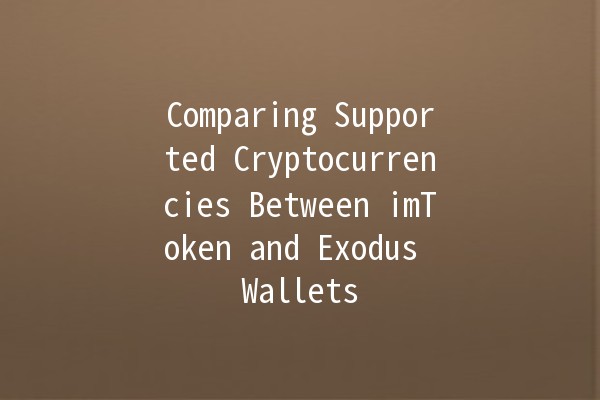In the rapidly evolving world of cryptocurrency, choosing the right wallet can significantly impact how you manage your digital assets. Two popular options, imToken and Exodus, offer distinct features and support for various cryptocurrencies. This article provides an indepth comparison of the two wallets, focusing on the types of cryptocurrencies they support and key features to help you make an informed decision.
imToken and Exodus are cryptocurrency wallets that allow users to store, send, and receive digital assets. Each wallet has unique offerings that cater to different user needs.
imToken is a mobile wallet originally designed for Ethereum and ERC20 tokens. Over the years, it has expanded support for various cryptocurrencies, becoming a versatile wallet for numerous digital assets. Its userfriendly interface and robust security features make it a popular choice among crypto enthusiasts.
Exodus, on the other hand, is a desktop and mobile wallet that prioritizes a seamless user experience. Known for its beautiful interface, Exodus supports a wide range of cryptocurrencies and allows users to exchange assets directly within the wallet. It has gained a loyal following due to its intuitive design and strong commitment to user privacy.

Both imToken and Exodus support various cryptocurrencies, but the selection varies. Below is a direct comparison of the cryptocurrencies supported by each wallet.
Ethereum (ETH): The primary cryptocurrency supported, allowing users to manage their Ethereumbased assets.
ERC20 Tokens: A significant number of ERC20 tokens can be held, reflecting the widespread adoption of Ethereumbased projects.
Bitcoin (BTC): Recently added support for Bitcoin, allowing users to manage one of the most popular cryptocurrencies.
Other Chains: imToken has expanded its offerings to include support for various blockchains, including TRON and EOS.
Bitcoin (BTC): The first and most predominant cryptocurrency available.
Ethereum (ETH) and ERC20 Tokens: Similar to imToken, Exodus supports Ethereum and a variety of ERC20 tokens.
Litecoin (LTC): Offers support for Litecoin, enhancing its appeal to users looking for a diversified wallet.
Multiple Altcoins: Exodus supports a wide variety of altcoins, including Bitcoin Cash (BCH), Dash (DASH), and more than 100 cryptocurrencies in total.
Besides the supported cryptocurrencies, other features can influence your decision when choosing between imToken and Exodus.
imToken: Provides private key management where users have full control over their private keys. Additionally, it uses encryption and biometric security for additional protection.
Exodus: Your private keys are stored locally on your device, ensuring that you have full control. Exodus also employs backup features to help restore your wallet in case of loss.
imToken: Designed for maximum accessibility, imToken’s interface is straightforward, making it suitable for beginners and experienced users alike.
Exodus: Known for its visually appealing interface, Exodus offers a userfriendly experience. The wallet's design is attractive and functional, making it easy for users to navigate.
imToken: While initially focused on Ethereum, it has expanded to support multiple currencies, but its primary focus remains on Ethereum and its tokens.
Exodus: Excels in multicurrency support, making it one of the most versatile wallets. Users can manage over 100 cryptocurrencies in one place.
imToken: While transactions can be performed, the wallet is more focused on holding and managing assets rather than swapping them.
Exodus: Builtin exchange features allow users to swap cryptocurrencies directly within the wallet interface. This is a significant advantage for users who frequently trade.
Example: Set a reminder every month to back up your wallet and write down your recovery phrase securely.
Example: Change your password every six months and use a password manager to create complex passwords.
Example: Subscribe to imToken and Exodus newsletters to stay informed about new assets being added.
Example: Whenever you plan to make a trade, use Exodus to swap currencies directly within the wallet to save on transaction fees.
Example: Spend a few minutes each week reviewing your portfolio's performance and adjusting your investment strategy based on the trends you observe.
Both wallets are userfriendly, but Exodus may have a slight edge due to its visually appealing interface and builtin exchange features. However, if you are focusing on Ethereum and ERC20 tokens, imToken could be a simpler option.
Yes, using multiple wallets is common in the cryptocurrency space. You can store different assets in imToken and Exodus according to their strengths, allowing for more diversified management of your cryptocurrencies.
If you forget your wallet password, both imToken and Exodus have recovery features. You can use your recovery phrase to reset your password and regain access to your wallet.
Both imToken and Exodus prioritize security with local key storage and encryption. However, always ensure your device is secure, use twofactor authentication, and regularly update your wallet software to enhance security.
Currently, neither imToken nor Exodus offers builtin staking or interestearning features. However, you can transfer your assets to dedicated platforms that provide such services while being cautious of associated risks.
Transferring assets between wallets is straightforward. Simply copy the receiving address from one wallet and paste it into the sending option of the other wallet, confirm, and wait for the transaction to process.
, when choosing between imToken and Exodus, consider which cryptocurrencies you wish to store, the features you value most, and your preferred user interface. Both wallets provide unique advantages and can cater to different user needs, making them excellent choices for managing your digital assets. Choose according to your preferences and make the most of the cryptocurrency experience!